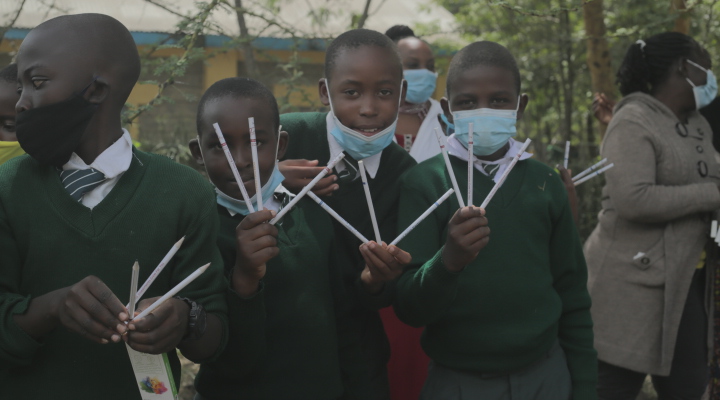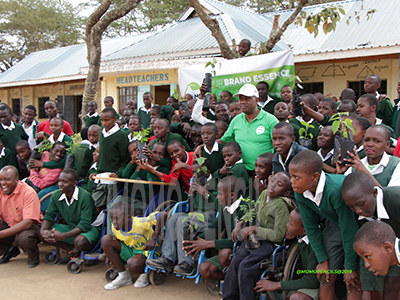
03 Sep INNOVATIVE IDEAS TRANSFORMING EDUCATION IN AFRICA
We live in exciting times where the norm of doing things is dominated by innovation. The education landscape is also gradually changing as new ideas, inventions, and new ways of teaching emerge.
The future success of education in the African continent lies to a large degree in its ability to hone the skills and talents of its ever-growing youth population. However, some argue that the current education system in Africa uses outdated methods and is not preparing children for the future.

Pupils of Athi River Primary School after receiving Momo Pencils
It is worth noting that innovation does not only mean technology, but it incorporates any creative, new way of doing things. If it improves learning, processes and systems, or solves a real problem, then it is innovation.
The current education in most African countries is essentially a standardized batch process in terms of years, process and standardized curriculum. Innovation and new ways of thinking is what will break the barriers of conservatism that exist in the education space so that we can make proven solutions accessible to more people.

One of the biggest topics that have been discussed especially for the Kenyan learner and largely the whole of Africa is the assumption that all children learn in the same way. That age-old learning method of sitting behind a desk and absorbing facts and numbers is still used across the globe. While this technique works for some learners, it does a disservice to others, who are left feeling academically inadequate.
One of the suggestions that has been brought to light is fusing creativity into lessons. Incorporating songs or singing into lessons is appealing to more pupils, and more will understand because now you are not only speaking their language but also bringing excitement into the class. Teachers can go beyond just writing with chalk on the blackboard and talking while in front of the class to a class that is half asleep only caters to one type of pupil.

Pupils of St Mary’s Tala during a tree planting session.
The rich culture of the African continent can also not be ignored when it comes to education matters. One of the cultures and lifestyle that has continued year after year is that of nomadic pastoralism especially in Kenya. These pastoralists still move from one location to another in search of grazing lands for their livestock. Children who grow up in such families tend to miss out a lot in school. This kind of lifestyle has proven to be a barrier to education as children from such families can never attend school regularly. To solve the problem, the Kenyan government got into a partnership with UNICEF to launch mobile schools which brought education to learners whose families had to constantly be in the move in order to earn a living. As part of the initiative, teachers now live and travel with the nomadic groups, setting up tents and temporary schools.
The rise of online learning
Online learning has quickly taken root in African schools with most primary and secondary schools embracing this mode of learning. For some, it is a cost-effective alternative to accessing formal education while for others; it is a foreign concept that can only be dreamt of. For those in the urban areas or those with easy internet access, it is as easy as logging in and continuing with the zoom classes. For others however especially in marginalized and poor neighbourhoods, it is a mirage accessing online education.

Pupils of Noonkopir Primary School during a tree planting session in their school.
One of the glaring barriers and a primary concern to online learning is Internet access because a fundamental part of online education is the online part of it. Sub-Saharan Africa has the lowest Internet penetration of any region in the world at just 40 percent. Moreover, the gaps between Internet usage vary with income between high- and low-income earners in certain countries. Considering these lower Internet penetration rates, online education would be less suited to tackle the poorest of the poor, but could benefit those on the higher end of the poverty spectrum.
The quality of online education offered is also becoming a point of concern with a report done by researchers at George Mason University revealing that, though general learning outcomes are similar for online and in-person courses, students such as those of lower socioeconomic background underperform in the online setting as compared to the traditional setting. The report further suggests that the disadvantaged may end up acquiring lower quality education because traditional classes offer valuable instructor-student interaction as compared to online classes.

Pupils of Kongoni Primary School.
Public universities now have to grapple with expanding capacity without sacrificing quality education which has allowed online-based institutions such as Unicaf, a pan-African university, to assert itself in the education system. Unicaf provides every student with a tablet and downloadable, offline course materials.
It is no secret that online learning is quickly becoming popular because of the advantage of convenience it offers both students and parents. Depending on how one chooses to look at it, students who have to cover long distance to go to school may find online learning advantageous since it tackles a number of barriers including travel time, school cost, and labor schedule. It is a known fact that the most important determinant of primary school enrollment is proximity.



No Comments